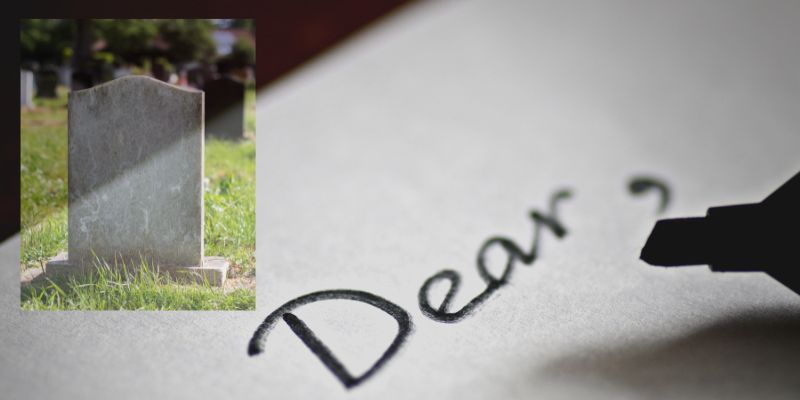Why and how you might write to someone who has died
In our fast-paced world, letter writing may seem like a relic of the past, yet its impact endures, especially when it comes to expressing sentiments that spoken words often struggle to convey. Writing a letter to someone who has died can be a profoundly therapeutic and meaningful effort. Whether they passed away recently or long ago, or even if you never met them but admired their work or influence, this act of writing can offer a unique form of solace and connection.
Here are six compelling reasons you might want to embrace this poignant form of communication. After writing them down, I realized that they related to three of the four essential connections of the Heartspoken Life: with God, with Self, and with Others:
- Finding Closure and Healing
Grief is overwhelming and complicated. When someone dies, we often have unfinished business, unspoken words, or unresolved feelings. Writing a letter to the departed allows you to express these emotions openly and honestly. It can help you say, “Goodbye,” “I’m sorry,” or to simply tell them how much they meant to you. This process can be incredibly healing, providing a sense of closure that is sometimes difficult to achieve otherwise. - Preserving Memories and Legacy
When you write to someone who has died, in a small way you are also preserving their memory and legacy. Sharing stories, recounting shared experiences, or reflecting on the impact they had on your life helps to keep their spirit alive. These letters can become cherished keepsakes for you and your family, capturing the essence of your relationship and the significance of the moments you shared. - Connecting with Historical Figures or Personal Heroes
Writing to someone you never knew personally but admired connects you with history and helps you draw inspiration from their lives. Whether it’s an influential historical figure, a beloved author, or a pioneer in a field that fascinates you, addressing a letter to them can help you articulate your admiration and explore how their contributions have shaped your perspectives. It can also be an exercise in gratitude, acknowledging the ways in which they have influenced your life and your thinking. - Processing Complex Emotions
Sometimes, we hold onto feelings of anger, regret, or confusion after someone’s death. Writing a letter can be a safe space to process these complex emotions. You can vent feelings, question motives, and explore your troubled feelings without judgment or interruption. This cathartic release can be incredibly beneficial for your mental and emotional well-being, allowing you to work through your grief in a healthy and constructive way. - Strengthening Spiritual Connections
For many, writing to the deceased can feel like a form of prayer or meditation, creating a bridge between the physical and the spiritual realms. Whether you believe in an afterlife, the power of the written word, or simply the strength of your emotional connections, this act can provide comfort and a sense of ongoing relationship with the departed. Afterward, you may feel the presence of that person ride more lightly on your heart. - Encouraging Personal Reflection and Growth
Writing letters to those who have passed away can also be a deeply introspective practice. It encourages you to reflect on your own life, your values, and your aspirations. By considering what you would say to someone who has significantly influenced you—positively or negatively—you gain insights into your own life’s journey and the lessons you’ve learned along the way. This reflection can inspire personal growth and a deeper understanding of yourself.
How to begin
If you’re considering writing a letter to someone who is no longer living, find a quiet, comfortable space where you can write without interruptions. Gather your thoughts, and don’t worry about perfection—write from the heart. You might begin with a simple greeting, explain why you’re writing, and let your emotions guide the rest. There’s no right or wrong way to do this; the most important thing is that it feels authentic to you. If you’ve ever written to God in a prayer journal, it’s a similar exercise.
In a world that seems to push us forward at dizzying speed, taking the time to write to the departed can be a beautiful act of remembrance and emotional expression. It honors those who have touched our lives and allows us to process our feelings in a meaningful way. Whether for closure, connection, or personal growth, this practice holds timeless value, whether you share your letter with anyone else or not.
To listen to Jenna Bush Hager reading a letter to her grandfather, George H.W. Bush, 13 years after his death, visit my “Today’s HEARTSPOKEN Note” newsletter episode called “Letters from the Past.”
What do you think?
If you’ve ever written a letter to someone who has died, or if you’re inspired to try, I’d love to hear about it. Feel free to share your thoughts in the comments below or privately by email or my website’s contact page. Let’s keep the conversation going and support one another in our journeys of connection, remembrance and healing.
Pin this:




 Wolves Regenerate Ecosystems In Yellowstone
Wolves Regenerate Ecosystems In Yellowstone